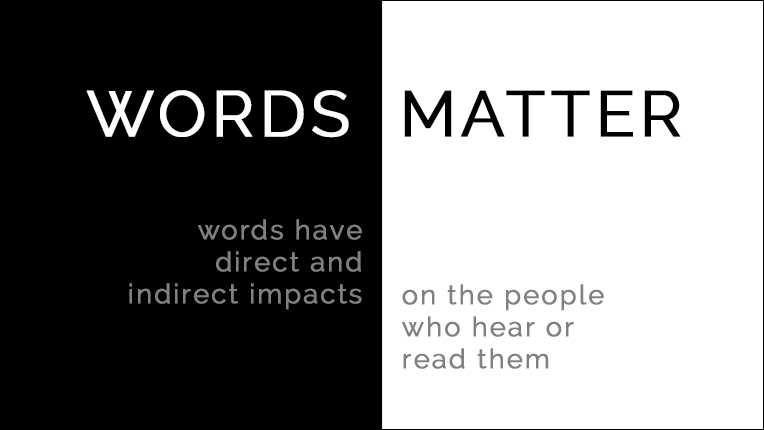Language as Inclusion or Exclusion: Can Artificial Intelligence Make a Difference?
"Language as Inclusion or Exclusion: Can Artificial Intelligence Make a Difference?"
Date: October 23, 2024
Time: 5 to 6 PM ET
Description: In celebration of Iberoamerican Heritage Month, also known as Hispanic Heritage Month, ACM hosted a panel focused on language inclusion in the computer science field. The discussion panel, “Language as Inclusion of Exclusion: Can Artificial Intelligence Make a Difference?” explored ways to reduce language barriers in computer science and how AI can address these disparities in underrepresented languages. Moderated by Indira Guzman, the panel will feature Franci Suni, Vinicius Pereira, and Nayat Sanchez-Pi.
Moderator
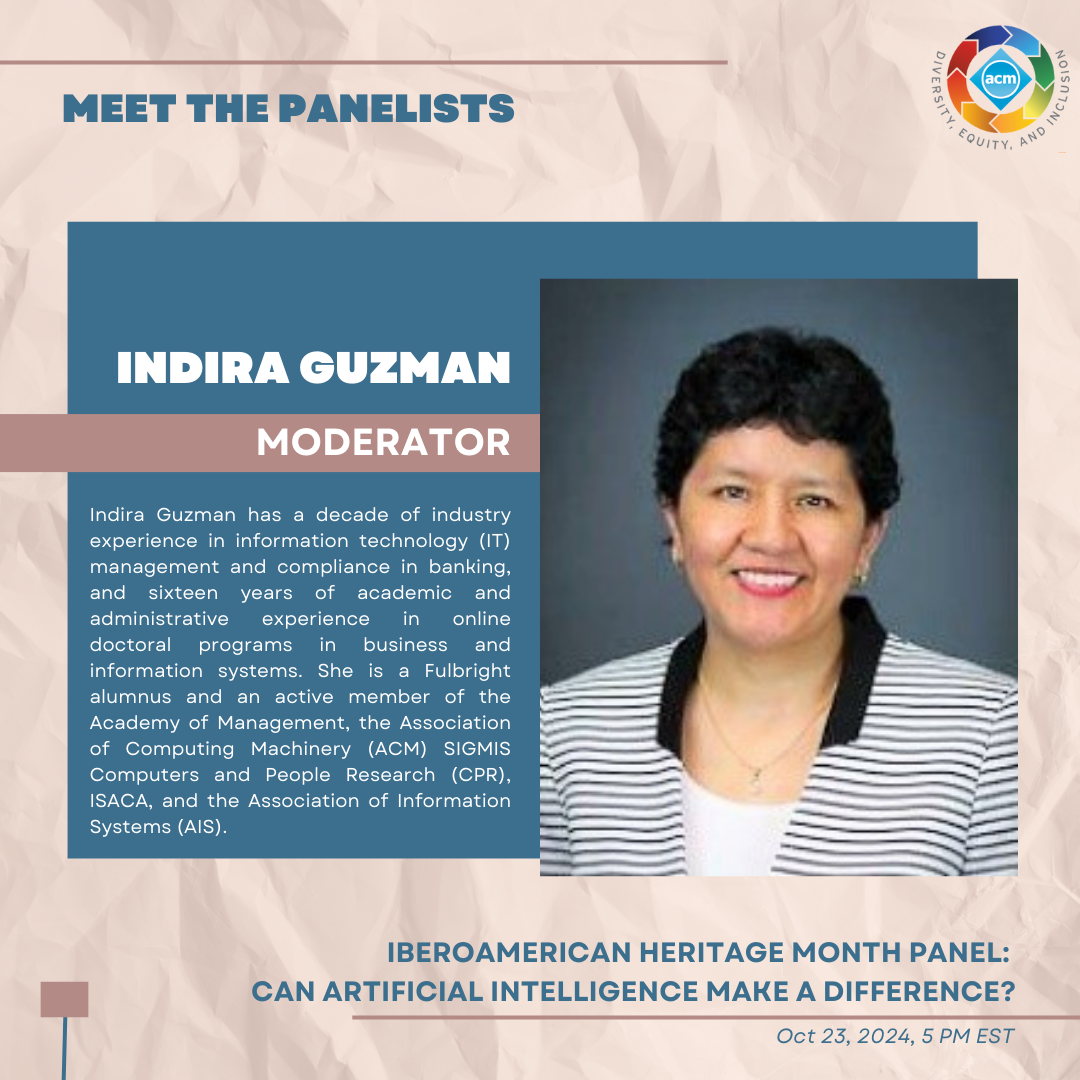
Indira Guzman
Dr. Guzman received a B.S. and a M.S. in Computer Science Engineering from Donetsk National Technical University in Ukraine, a M.S. in Information Management and a Ph.D. in Information Science and Technology and from Syracuse University. She has a decade of industry experience in information technology (IT) management and compliance in banking, and sixteen years of academic and administrative experience in online doctoral programs in business and information systems. Dr. Guzman is a Fulbright alumnus and an active member of the Academy of Management, the Association of Computing Machinery SIGMIS Computers and People Research, ISACA, and the Association of Information Systems. She currently serves as the 2021-2023 President of the Latin American and Caribbean Chapter of the Association of Information Systems. She is also a research consultant for the 2022-2025 research project entitled "Latin American Open Data for Gender Equality Policies Focusing on Leadership in STEM" funded by the International Development Research Centre in Canada for the Gender in STEM Research Initiative aimed to reduce the gender gap in IT leadership in Latin America.
Panelists
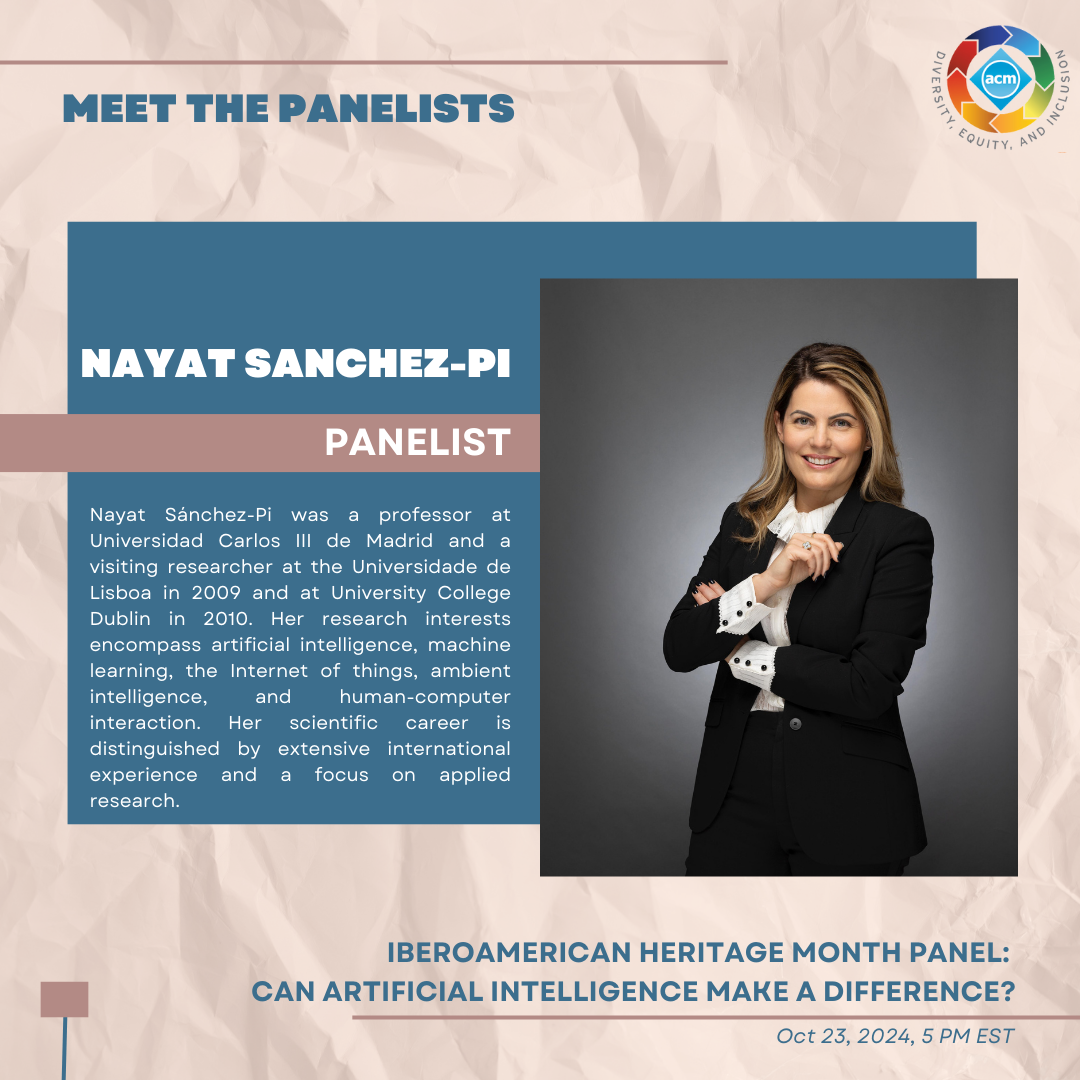
Nayat Sanchez-Pi
Dr. Nayat Sánchez-Pi is an expert in artificial intelligence with a distinguished international career spanning Europe and Latin America. She is the General Director of Inria Chile, the Chilean center of the French National Institute for Research in Digital Sciences and Technologies (Inria) whose mission is to operate Franco-Chilean cooperation in digital sciences and artificial intelligence and through this between Europe and Latin America. She has developed her scientific career mainly in Spain, Brazil, France and, more recently, Chile. Before joining Inria, she was a professor of Artificial Intelligence and Human-Computer Interaction at the State University of Rio de Janeiro, and founder and co-director of the Research Group on Artificial Intelligence and Optimization (RIO Group). Previously, she was a professor at the Carlos III University of Madrid in the Applied Artificial Intelligence Group.Dr. Sánchez-Pi holds a PhD in Artificial Intelligence from the Carlos III University of Madrid, for which she obtained the Extraordinary Doctorate Award.
Throughout her career, she has focused on artificial intelligence and human-computer interaction, emphasizing responsible and ethical AI to solve critical real-world problems with high social, economic, ecological and technological impact. She has extensive experience leading several interdisciplinary R&D teams that include academic and industrial partners. Dr. Sánchez-Pi is actively involved in shaping the future of AI on a global scale. For several years, she has been collaborating with several governments on their national AI strategies. She collaborates with UNESCO and is a member of expert groups at influential organizations such as the World Economic Forum (WEF), contributing her expertise on ethical and responsible AI and AI governance. She also collaborates with the Global Partnership on Artificial Intelligence (GPAI) and is a member of the Global Commission on Responsible Artificial Intelligence in the Military Domain (GCRAIM). She sits on several boards and committees and as Vice President of the Chilean Association of Information Technology Companies, which promotes public-private collaboration for the development of sustainable and ethical AI.
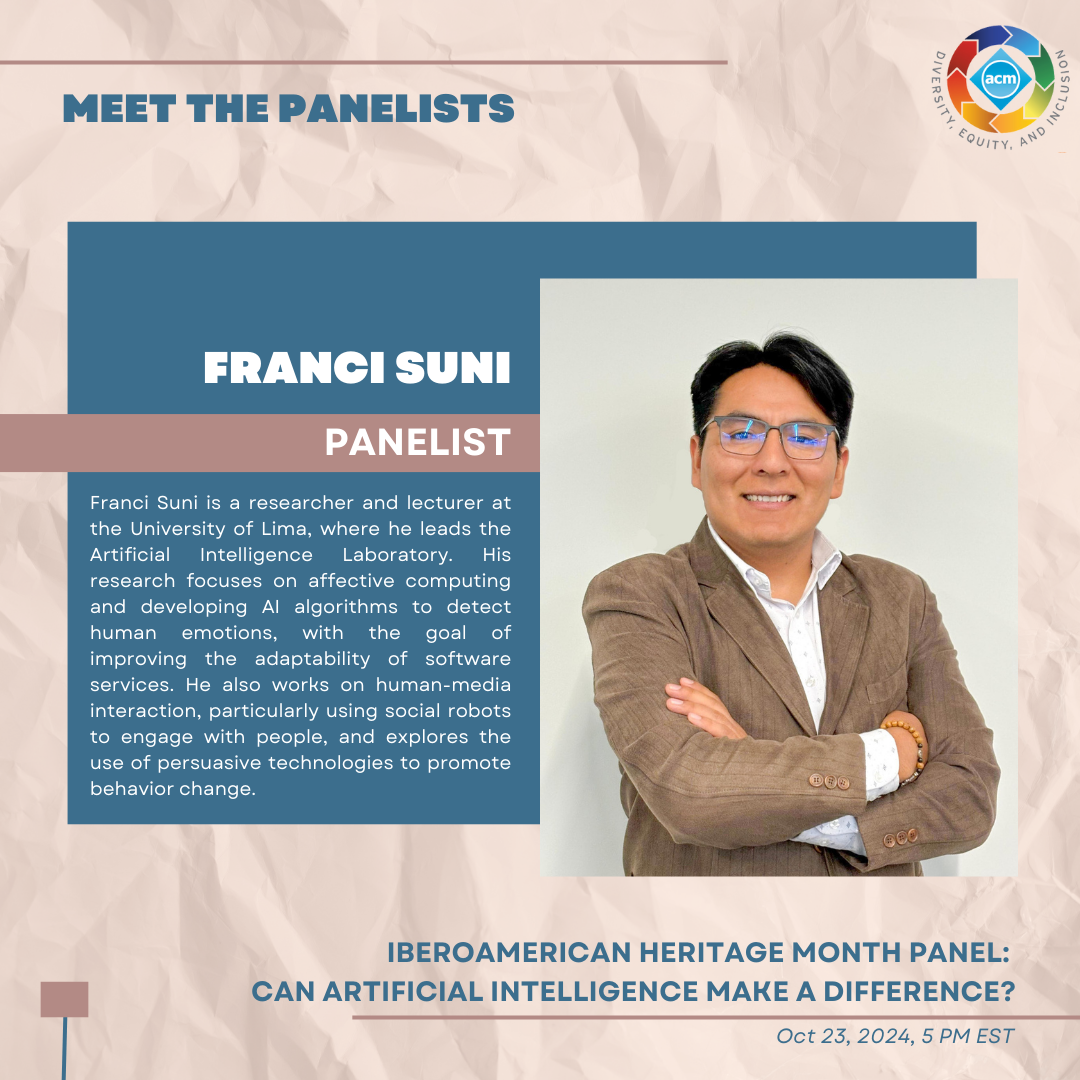
Franci Suni
Franci Suni is a researcher and lecturer at the University of Lima, where he leads the Artificial Intelligence Laboratory. His research focuses on affective computing and developing AI algorithms to detect human emotions, with the goal of improving the adaptability of software services. He also works on human-media interaction, particularly using social robots to engage with people, and explores the use of persuasive technologies to promote behavior change.
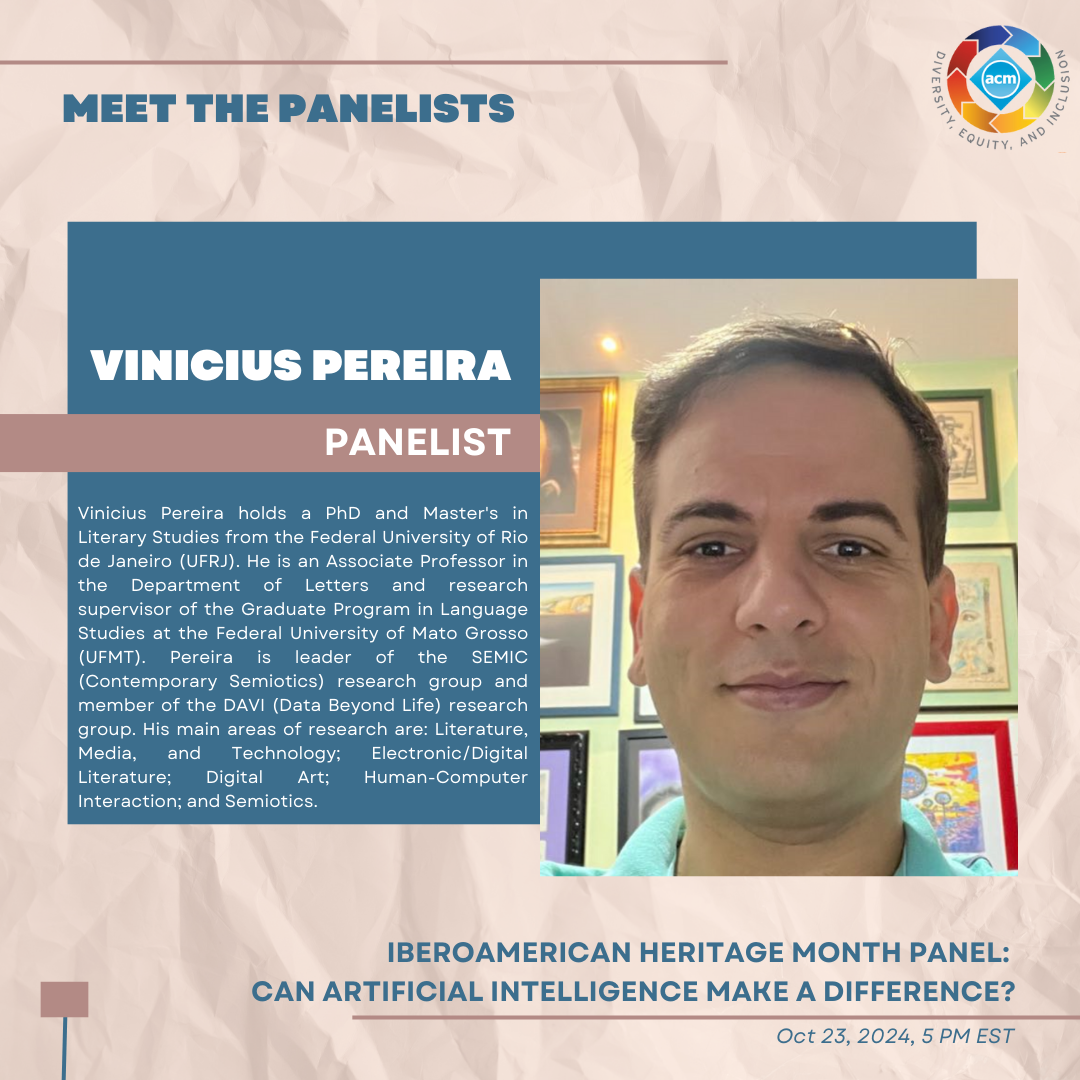
Vinicius Pereira
Vinicius Pereira holds a PhD and Master's in Literary Studies from the Federal University of Rio de Janeiro (UFRJ) and completed a postdoctoral research at the University of Nottingham (UoN), UK. He is an Associate Professor in the Department of Letters and research supervisor of the Graduate Program in Language Studies at the Federal University of Mato Grosso (UFMT). Pereira is leader of the SEMIC (Contemporary Semiotics) research group and member of the DAVI (Data Beyond Life) research group. He was also a former editor of the "Culture and Critique" column in SBC Horizontes journal. His main areas of research are: Literature, Media, and Technology; Electronic/Digital Literature; Digital Art; Human-Computer Interaction; and Semiotics.
Awareness Months Archive
Embracing diverse perspectives, backgrounds, and experiences enrich the ACM community and strengthen ACM's ability to support the global computing community. Awareness months are a time dedicated to reflection, education, and engagement to understand and embrace the diverse membership within the ACM community. Our archive display the past and current celebrations ACM have created to foster an inclusive and equitable environment for all within the computing community.
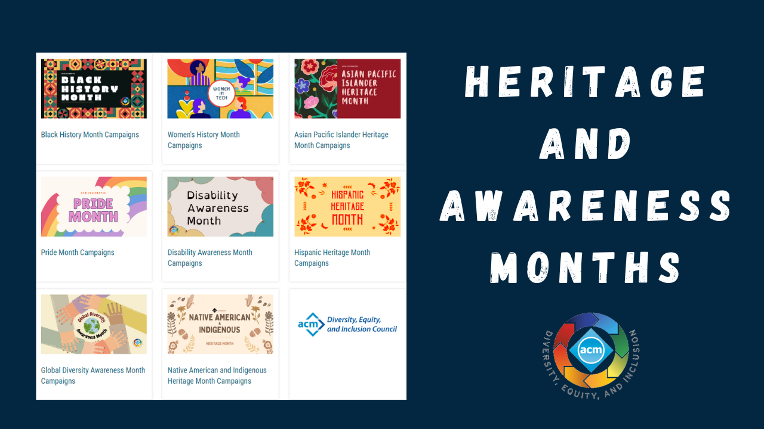
How Diverse Is Your Team?
ACM's Diversity, Equity, and Inclusion Council is an essential resource for SIGs, conferences, boards, and councils looking for best practices to improve diversity in their organization and develop programs with a broader reach in the computing community. Our guide provides examples of both inherent and acquired characteristics, which should be taken into consideration when looking at ways to improve the diversity of your team.

Words Matter
As part of ACM’s efforts to combat exclusion in the computing profession, ACM's Diversity, Equity, and Inclusion Council has launched an effort to replace offensive or exclusionary terminology in the computing field. They have developed a list of computing terms to be avoided in professional writing and presentations and offer alternative language. The Council plans to expand this list in the future and invites the community to submit suggestions for consideration.
